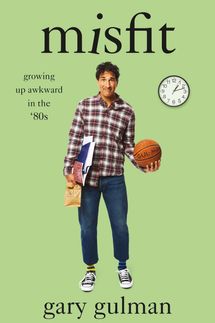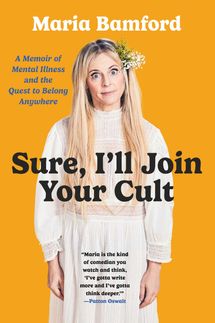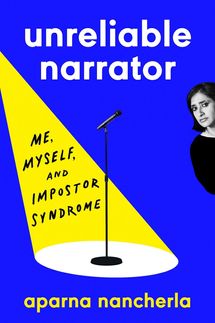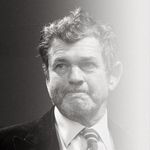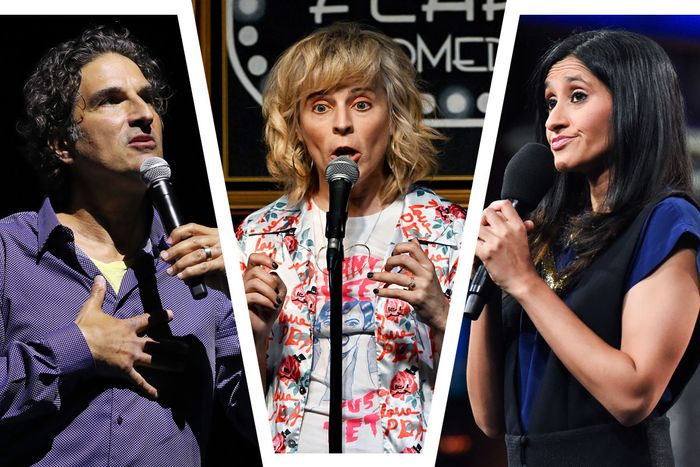
There has long been a stigma around openly discussing mental illness, but that has started to shift over the past decade, partly thanks to the work of Maria Bamford, Gary Gulman, and Aparna Nancherla, three stand-up comedians whose work has frequently explored their struggles with anxiety, depression, and other mental-health issues. This month, all three released personal memoirs and essay collections that expand upon and dig deeper into this area. The comedians recently got on a Zoom call for a roundtable interview to talk about writing books, being funny on the page versus the stage, if it’s time to bring a little stigma back to the topic of mental health, and more.
Why did you write a book?
Gary Gulman: Revenge. When I gave my mother the book, she immediately started scanning it for her name and “mom” and “mother.” She’ll call me and say, “Well, that’s not who I am.” My wife is so helpful in these things. She said, “Barbara, this book is full of quirky things about you that people are going to love. You’ll notice it is not titled Surviving Barbara Gulman. It is not really about you, and he loves you.”
That’s the joke answer. The real answer is that I love books and I’ve always aspired to write a book, and I’ve always had these stories that I tell about my life as a child that I remember so vividly. I love to tell these stories with an elevated voice like they were so important — like there was a late library book that takes up four or five pages, and it was this traumatic experience. It’s sort of an extension of our stand-up.
Maria Bamford: I just put anything that I would yell onstage in capital letters.
G.G.: I listened to Maria’s book. I just want to get this out there: I was blown away. And also — and I think Aparna would agree — I’m so grateful that I didn’t come across it before I wrote my own, because I would’ve retired. It’s so good, which is a high compliment from comedians to say that it made you feel bad about yourself.
Aparna Nancherla: It’s the highest compliment.
M.B.: Oh, no! Well, I haven’t read yours yet, but I read Aparna’s. That was exquisite, and just so thoughtful and about the art of stand-up and then where do you belong in it. It was wonderful, because I get to know Aparna better as well. She’s a lovely person. I can’t wait to read yours as well, Gary. But the reason I wrote the book was just an offer of money.
How much money?
M.B.: Mine was $150,000, but I did not read the contract. Do you know how that’s paid out?
I do know, yes.
M.B.: Like fish to a seal. Tiny little bits, my friends. Tiny little bits. And then it’s all in the contract, and they go, “Oh, we say when the book’s done, not when you do.” Oh, come on!
A.N.: I’m sure there’s a precedent for that. I’m sure they were paying everyone right away and they were like, “Oh, nobody has turned in a book.”
M.B.: No, every writer in the ’40s and ’50s, every alcoholic problematic poet is like, “I got to have another year. I know it’s been seven years since you gave me the first taste of cash, but I’m going to need a couple to float me.”
A.N.: “I just discovered absinthe. I need another year.”
I was paid quite a bit, but I think that was kind of also probably the only way I would’ve written it. It was supposed to be a book about self-doubt, and then that’s all they brought up when I tried to write it. So it was sort of a little bit of a … monkey’s paw is not the right analogy, but I’ve run out of analogies since writing the book.
Were there books you looked to for inspiration?
A.N.: I wanted to write an essay collection. I have always enjoyed reading essay collections, whether comedic or not. I really enjoyed Jessi Klein’s and Mindy Kaling’s. And I loved Bossypants, which is more a memoir. But I also just love essay collections in general. I love Jia Tolentino’s book. But then I felt like when I was writing a book, I didn’t want to read anyone’s, because when I did read one, I would just be like, Well, I can never write this. I’m going to just give up. Also, when you’re writing a book about self-doubt, you’ll take any excuse to stop writing.
G.G.: I read so many books about memoir and writing. I read this collection of Kurt Vonnegut’s ideas on writing that were cobbled together from everything he’s ever said about writing called Pity the Reader. Then I read Stephen King’s On Writing. The best thing he said in that book was, “You need to be a great reader. You need to read a lot,” which gave me this thing where I was not just procrastinating, but also reading, which I felt good about.
In terms of memoirs, Adam Resnick, the creator with Chris Elliott of Get a Life and Cabin Boy, wrote this book called Will Not Attend, which was a collection of essays. It was the funniest thing I ever read, and it gave me something to aspire to. It was so beyond what I feel I’m capable of, but I love that. And then Tobias Wolff had this book called Old School, which kind of intersected with what I was doing, which was recalling my kindergarten through 12th grade. And then Anne Lamott’s Bird by Bird, and Mary Karr’s book on memoir and her memoir.
So I just kept reading, and then I realized, Oh, I’m just putting off my writing. And I said, “Okay, you need to earn some reading by writing for an hour.” So I was just reading and writing all day, and luckily I’m married to a reader. My wife reads all the time. It was also during the pandemic, so everybody understood any kind of behavior. So it was really helpful.
M.B.: I read a Memoir Writing for Dummies book. I love those For Dummies things where they just tell you exactly what to do with little cartoons and then you do it. I did read other memoirs, which I did not try to hit the ball out of the park like they did, like The Center Cannot Hold, by Elyn Saks, is this wonderful personal memoir about schizophrenia. Lit by Mary Karr. Madness by Marya Hornbacher. There’s some really beautiful memoirs out there. There’s no aspiring to that. Like, there’s no way.
Gary, you already mentioned your mother. Did you all discuss what you could or could not include with your families? Maria, you joke about how your sister doesn’t want you to talk about her, and you still do it anyway.
M.B.: Yeah, she still talks to me, so I think, Oh, I’ll just keep talking about her. It’s okay, right? It’s okay. It’s probably not okay. But she also talks about me. My sister writes, and she writes about me in her book. There’s a little confusing dynamic there. We could work it if we took a class.
A.N.: That feels fair, though, that you both have books as outlets. I always feel bad, because with my family members, I’m like, They’re not writing books, so where do they get to complain about me, besides to a professional for money?
G.G.: Yeah. I felt bad about certain things. There are certain people in my life who I changed their names if I said bad things, but that was because a lawyer would ask. At one point she said, “Now your Uncle Norman, the burglar, is he still alive?” And I said, “Oh, no.” And she said, “Okay, good.” Because there are certain people who they don’t want to sue. But then they said, “Do you think there’s any way your mother would sue you?” And I thought, I hope not. And also, she’s old enough where I feel we could delay the lawsuit for a while and wait her out, and then she would have no standing, obviously.
But I read this thing that Anne Lamott said where she said, “If you didn’t want me to write bad things about you, you should have been kinder.” Then I also think of the idea that I could have gone way harder. I went easy. If they call me on anything, I’ll say, “I left out a lot of bad things, so you should be grateful.”
A.N.: I feel like my dad was very diplomatic. I don’t write a lot about my family, but I had one or two essays, and I ran them by all my family members. My dad was like, “Well, if that’s what you remember, then fine.” And I was like, Okay, this feels like the best place we’re going to get with this.
G.G.: That’s so healthy because my family just fact-checks everything: “That didn’t happen, and that’s not how.”
Can I ask a question?
Yeah, go for it.
G.G.: How long from when you started? I started in January of 2020 right before the pandemic, and finished February of 2023. So it took me three years, and I was supposed to do it in much less time. I kept getting extensions, whereas they should have said, “Well, there’s a pandemic, so we’re going to cut down the amount of time.” But they wound up taking even more time. So I’m just curious how long it took you guys in total.
M.B.: It took me like three and a half years. Yeah, it was ridiculous.
G.G.: Okay, I don’t feel as guilty.
A.N.: I think it was spring 2019, and then I turned it in December 2022. So also about three years.
Did you feel like there are things you had never been able to talk about onstage that you were able to put in the book?
M.B.: There were parts where it’s like I go, Oh, I guess I could talk about that onstage. But that is the problem sometimes in memoir, and this can happen with comedians: People will do jokes from their act and they go, Oh, I don’t want to put jokes in the book and then put them onstage and people are like, “Oh, I know that one.” That’s one thing I put throughout my book: If it was a joke from my act you may have heard, there’s a recycled icon next to it.
A.N.: I loved that.
G.G.: Yeah, in the audio, there was an audio cue for those types of things. It was really fun. That was the one thing I really loved, Maria — how innovative you were with the form, which isn’t surprising because that’s the way you are with your stand-up.
In the ’90s when I first got out of college, I didn’t have much money, but I was interested in comedy so much so I’d buy stand-ups’ books. I would get three pages in and scream, “It’s just their act!” I know their act, and I was outraged and I felt conned.
Those ’80s comedians, they stuck with the same hour for 60 years. Luckily we came up in a time where it was like, No, you got to write a new set every once in a while. So I vowed — and it was completely delusional to make any kind of vow as an open mic-er — but I was like, Well, when I write a book — and I said “when,” which is insane — When I write a book, I’m not just typing up my act. Then I was like, Well, also, you can’t do a set to promote your book where the people are reading it and saying, “Oh, he just did what he said he would never do. He just sold us the book and then did jokes from the book.” So it’s just been a turmoil all summer long, coming up with a set that I can feel safe doing.
One thing I love about the writing form is that I feel less anxious about not being funny for longer on the page than I do onstage. Onstage, there’s almost like this timer in my head where I’m like, Be funny, you bore, whereas on the page, I can talk about the fact that my father was born in a mental institution because my grandmother was bipolar without bumming out the audience and losing them for the next five minutes. Because you can’t go from there into, “There are a lot of different varieties of Oreos these days.”
M.B.: I’m there for you on that.
A.N.: Yeah, me too. I’m ready for the transition.
M.B.: I think that’s your opener and your closer: “Oh my God, I wish my grandmother was still around to enjoy all the flavors of Oreos.” Oh my God. Is she still around, your dad’s mom?
G.G.: Oh, no. Nor is my dad. My grandmother immigrated from Russia in, I want to say, 1900.
M.B. and A.N.: Oh, wow.
M.B.: Did she ever get to leave the institution? Or was she institutionalized her entire life?
G.G.: She lived in the institution, and when my dad was 7 she was able to bring him back into her life. All the damage had been done, but she was able to add different things like bringing him to school and telling the teachers that he was in second grade, not first. It was relentless with this poor guy. He was in foster care and then adopted by his grandparents at 4, and then shuttled to his mother, who was not well. He had every reason to become a mass murderer, and instead he became this really kind, thoughtful mensch of a guy. So I’m really grateful that he was able to manage mental illness much better than I did.
A.N.: Wow. That’s incredible.
M.B.: That’s incredible. And yeah, I’d be down to watch all that as stand-up.
A.N.: Me too.
Well, sure, you two would.
M.B.: I mean, people are monsters. These people I was performing for last night, I mean, they’re eating slices of pizza and they’re going, “I work for Microsoft.” Fuck off. Not that that’s not important too, but I think that’s a different alley of the art form. Crowd work is a specific type of comedy and it’s beautiful to watch, but I am not that interested in it — or as a performer I’m not. I do love to watch it.
G.G.: But when I saw you at Sony Hall, you had a conversation with a person in the audience. This was so amazing. You gave the person $100 to interact with you. And oh my gosh, worth every penny.
M.B.: Yeah. That’s a new bit I’m working on is that that’s invisible work. Especially when we’re talking to them, it’s like, Oh my God, I’m getting all the material from you. I want to acknowledge the skill it takes to talk to a comedian. Then I just talk about money and how hard it is to get paid, or how weirdly emotional it can be.
I don’t know if you guys had this, but when a famous person texts you and says, “Can you do this thing?” and there’s no mention of money, and you go, What? I just find that it’s ongoingly bizarre. I find that very interesting — not only in comedy, but just in the world, where it’s like people don’t pay people a living wage. Anyways, there are no jokes there, obviously.
G.G.: No, I do those things sometimes where the celebrity invites you and never mentions pay. Then I’m looking back on it and I’m like, Oh, but I did get the opportunity to be snubbed by Adam Driver in the greenroom, and Bill Murray took a picture with my wife. So was that worth it? I don’t know. I just felt terrible about myself. You watched my show, and now you’re snubbing me?
A.N.: I did a show recently that a famous person asked me to. There was no mention of money, and then I think for months I was so mad about it and was just like, He has so much money. Why didn’t he just pay us? Then months later, I saw that it was for charity, but nobody told me.
M.B.: But here’s my argument: Even if it’s for charity, if it is produced by somebody who has a shit ton of money, pay the performers, especially if it’s going to be combat performance, which is what benefits always are: where people are in a hostage situation for three hours where suddenly you find yourself trapped watching a dance on behalf of Parkinson’s. Stop. Let’s stop it. It’s a gig. That’s legitimate work.
A.N.: No, it is.
M.B.: When somebody says something’s a benefit, I just go, “I would like to give money instead.” My husband and I — and it is virtue signaling — give 11 percent of our income to charity. Could we give more? Yes.
A.N.: I think it’s also a lot of things in show business that people are just like, “Well, you should be grateful for the exposure.” And it’s just like, “People used to die of exposure.”
G.G.: And it’s not virtue signaling. It’s virtue! You are a very generous person!
M.B.: In so many cultures, it doesn’t count if it’s said. Like, it’s not a mitzvah if you tell anybody about it.
G.G.: This whole thing where it has to be anonymous or it’s not a mitzvah is said by Jews who have their name on everything they give to. On every seat in every theater, there’s a Jewish name on the back. It never says “anonymous Jew.” It says “the Weinsteins.”
M.B.: It’s heartening to know that you guys have the same experience. I was talking to this woman in the crowd who worked at an aquarium, and she didn’t want to ask for money because she felt like she was so lucky to have her job, because part of her job is she does performances with seals, and the seals give her a kiss. But sometimes they want to do private gigs where she has the seals give her a kiss. And I’m like, “The reason they hire you is because they need you. You’re special. That seal wants to kiss you and only you. Raise your prices.”
All of you talk about struggling with mental health onstage. Especially when you first started performing, Maria, there was such a stigma around discussing that anywhere, let alone in stand-up. That has shifted. How do you feel about this shift, where young, inexperienced comedians feel comfortable going in these sensitive areas?
M.B.: I think it’s great. I’m super pumped. I want to hear more points of view. And the fact that it’s an afterthought — the same thing as people talking about being gay or something — it’s less of a big reveal. It’s just positive — for me, anyway. There’s always a process for material, so I would never tell anybody, “Oh, yeah, there’s a certain way you got to bring it.” I don’t know what I’m talking about. But also, I wouldn’t make it at the Store.
G.G.: I think there are a couple of things going on. One I would say is just comedy in general — stand-up comedy especially — is this great thing at letting people off the hook. In some cases it’s a great letting off the hook for people being mentally ill, for taking medicine, for going to therapy.
When I heard Garry Shandling, for instance, or Richard Lewis growing up talking about being mental, I thought, Oh, okay. At the very least, there are two other Jewish men who feel the same way as me. I remember there was a woman in Boston when I first started named Barbara Swanson, rest in peace. She talked about being on Prozac in 1993. I remember thinking, Oh my gosh, I’m on Prozac. I would never tell anybody who wasn’t my doctor that I was on Prozac. I keep it from my family, I keep it from everyone. She’s telling a room full of strangers. This is brave.
The other side of that is a lot of comedians let audiences off for being racist, sexist, and homophobic. So that’s not good. But we’re really good at letting you off the hook for things that you shouldn’t feel shame or guilt over. As far as young comedians talking about it, I love it. It’s just that I hope they don’t get discouraged if it doesn’t go over well because they’re performing in front of Philistines mostly and the most hostile audiences, and they’re going to be like, Well, this doesn’t work. And it’s like, no, you’re performing in front of people who hate this art form.
M.B.: Pearls before swine.
A.N.: Yes, yes, yes.
G.G.: I know Maria said she admires crowd work … It’s awful. It’s so easy. And if I was in the audience and somebody asked me what I did for work, I would stand up and scream, “What do you do for work? I came here to hear jokes that can be enjoyed as forms of art!” Of course there are two or three people who do it well, and the rest of them are just doing a photocopy of a photocopy of the people who do it well. I think they should give the audience their money back if they don’t do any jokes that they pre-wrote.
Also, crowd work is not that hard. And it’s always men, and they do it six shows in a row. They ask somebody what they do for work, and the person doesn’t say something exciting, so they shit all over them for five minutes. There’s nothing easier.
A.N.: I might be coming from a different perspective. I feel like Maria and Gary were already talking about mental illness in their act before I did. I started talking about it because I was struggling with it at the time pretty acutely, and I didn’t know what else to write about.
But I remember when I was first diagnosed with depression when I was 19, I was pretty jazzed about it. It was the first time I had a label or some sort of understanding of why I felt the way I did. Because before, I thought everyone felt that way, they just handled it better than I did. I was really excited to tell everyone I had depression. I’d be like, “That’s why I’m kind of glum.” I just was really pumped about it, so I think I’ve always had this sort of attitude of, Why wouldn’t we tell everyone? That explains why I cancel all the time and stuff.
Seeing younger generations do that, I’m like, Yeah, you’ve got to be open about it. And I almost have the opposite reaction of the petty insecure part of me of like, Uh-oh, my take on anxiety is no longer fresh. But yeah, I love that it’s become more in the ethos.
Different comedians and different memoirists might have different perspectives on the truth — what details you can or cannot stretch. How is your relationship to truth in your books different than your acts?
A.N.: I’m more honest in the book just because I can’t make everything as polished and neat as stand-up can be, which is just a little bit more graceful, I guess, in some of the ways you handle things. I feel this way with my stand-up as well, but when I will listen to a bit later, or if I write an essay and read it a couple weeks later, I’ll be like, Do I even feel the same way about any of this? I just feel like it’s a snapshot of where you are, and you have to be okay with the fact that it’s a record of who you were as a person at the time, but you’re probably not always going to be like, “I really stand by everything I said here.” Because, yeah, we are just such fickle imperfect creatures that I think our memories are just always kind of shape-shifting a bit.
M.B.: I definitely changed names of people so they wouldn’t be recognized — different people from high school, my violin teacher. But I didn’t change things about my family that I remember. My husband and I talked about our relationship, so I don’t think I changed anything there.
With stand-up, I’m much more likely to fudge the details to make it. I tell this story about Harvard. The way I tell it is I was by myself at this Harvard party, and it turns out my friend Jackie was with me the whole time. But it’s more hilarious if I’m just sad by myself being trapped by these young people, and of my own accord. It was one of those things where you go, Yeah, I want the prestige. I’m so delighted by the shiny object. And then you did get closer to the shiny object, and you wish you were getting paid.
G.G.: I notice that when I take that kind of artistic license, people will come up to me and say, “Well, that wasn’t true, and this wasn’t true.” I feel more comfortable doing that onstage.
There was that guy who lied in his memoir, and Oprah was very disappointed in him. And the entire time writing, I’m like, I don’t want Oprah to yell at me, so I need to be honest about this. My editor would be like, “Is this really true?” And I would say, “Yes. I promise my mother really said that verbatim.” I was so worried. Then you hear certain writers like Spalding Gray would say, “Well, these are lies I used to tell the truth.” And I’m like, “Oh, no, I’m not lying.” I don’t want to get sued, and I don’t want to get yelled at by people who gave me money and also take the money back.
All the books express some desire to help someone in some capacity. Was that something you thought about? Is it different than stand-up?
A.N.: It feels a little presumptuous to write a book that’s all about yourself and what you think and feel and your insecurities, and be like, This is to help other people. But I do think I wrote it all down on the page as a way to capture what I have tried to do with talking about my struggles with mental health in my stand-up, which is that a lot of these things are kind of messy and unresolved, and it’s hard to really make sense of ourselves as people sometimes when we’re in the middle of experiencing it. Creatively, trying to get some of it down on the page was a way to make sense of it for myself.
But as with talking about anxiety and depression in my act, I found that sometimes these topics resonate with other people more than I think they will, just because I live so much inside my head that sometimes I forget that other people are having the exact same experience deep inside their heads. So yes, I would say my writing in general is a way for me to get my brain on to the page and hopefully meet other people halfway with their brains when they’re reading whatever it is I write or hearing me talk about it onstage. So if my book does help people, it always comes as a surprise to me, and it always feels very humbling and connecting when it does happen.
M.B.: I think with a book, you can get into the details more, and people have more patience, or they’ll be able to skim to the good parts. I have a bit about the suicide hotline and how there’s sometimes a 45- to 90-minute wait. But I can explore that in the book by going through all the different things you can do for free if you have treatment resistance. So that was nice.
G.G.: Maria talking about her depression helped me feel comfortable saying that I had depression, because I admired her so much. But what I found in opening up about my depression is that just saying you suffer from it, and what it causes in your life, makes people feel less alone, and that’s very helpful.
My book covers kindergarten through 12th grade, and it shows I was miserable a lot of the time. But it also shows I was doing these things that I never thought I would be able to do. We overcome so many things that we imagined initially that we wouldn’t be able to do, and then we immediately forget that we have this ability to figure things out.
I just want to remind people that you were overwhelmed by so many things in your life, and if you’re alive, you’ve figured it out. Please remind yourself that you are a machine of overcoming things that you thought would eventually be impossible. And some of them we do now without thinking twice about it, like tying our shoes or figuring out how to do an interview on Zoom. I used to get so anxious when they would tell me it was on Zoom. I was like, I’m going to lose the feed, and I’m going to freeze, and I’m going to apologize, and I’m going to look terrible. So I bring a ring light everywhere I go, just in case. And now I just really looked forward to talking to Jesse, Aparna, and Maria, where literally six months ago, I would have had an anxiety attack over just the fact that I didn’t get in on the first try. I used the wrong link, and I would have given up and and stayed in bed the rest of the day.
Would you write another book?
A.N.: If I wrote another book, it would be a completely different genre — maybe either just more strictly comedic, or a novel, or perhaps a cookbook that’s also a mystery. I just think I need to go as far away from my inner demons as possible. Maybe I’ll just write an informational pamphlet for how to find a public restroom in New York, which actually feels like it would be pretty useful.
M.B.: If anyone offers me money, yes.
G.G.: I have the same feeling. If people like it and I get enough encouragement — otherwise, I will say, Oh well, I gave it a shot, because it’s hard and I’m very sensitive to criticism.



